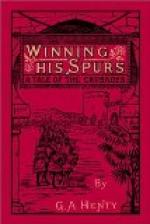The galley-slaves again took their places, and this time willingly, at the oars, the places of the weakest being supplied by the English, whose want of skill was made up by the alacrity with which they threw their strength into the work; and in an hour from the time that the galley had arrived alongside of the “Rose,” her head was turned north, and with sixty oars she was rowing at all speed for the mouth of the bay.
CHAPTER XI.
In the holy land.
As soon as the galley which had escaped reached the town from which it had started, it with three others at once set out in pursuit; while from a narrow creek two other galleys made their appearance.
There were a few words of question among the English whether to stop and give battle to these opponents, or to make their way with all speed. The latter counsel prevailed; the earl pointing out that their lives were now scarcely their own, and that they had no right on their way to the holy sepulchre to risk them unnecessarily.
Fortunately they had it in their hands to fight or escape, as they chose; for doubly banked as the oars now were, there was little chance of the enemy’s galleys overtaking them. Gradually as they rowed to sea the pursuing vessels became smaller and smaller to view, until at last they were seen to turn about and make again for land.
After some consultation between the earl and the captain of the lost ship, it was determined to make for Rhodes. This had been settled as a halting-point for the fleet, and the earl thought it probable that the greater portion of those scattered by the storm would rendezvous there.
So it proved; after a voyage, which although not very long was tedious, owing to the number of men cramped up in so small a craft, they came within sight of the port of Rhodes, and were greatly pleased at seeing a perfect forest of masts there, showing that at least the greater portion of the fleet had survived the storm.
This was indeed the fact, and a number of other single ships dropped in during the next day or two.
There was great astonishment on the part of the fleet when the long swift galley was seen approaching, and numerous conjectures were offered as to what message the pirates could be bringing—for there was no mistaking the appearance of the long, dangerous-looking craft.
When, upon her approach, the standard of the Earl of Evesham was seen flying on the bow, a great shout of welcome arose from the fleet; and King Richard himself, who happened to be on the deck of the royal ship, shouted to the earl to come on board and tell him what masquerading he was doing there. The earl of course obeyed the order, anchoring near the royal vessel, and going on board in a small boat, taking with him his page and squire.
The king heard with great interest the tale of the adventures of the “Rose”; and when the Earl of Evesham said that it was to Cuthbert that was due the thought of the stratagem by which the galley was captured, and its crew saved from being carried away into hopeless slavery, the king patted the boy on the shoulder with such hearty force as nearly to throw Cuthbert off his feet.




